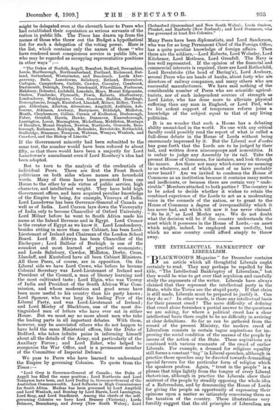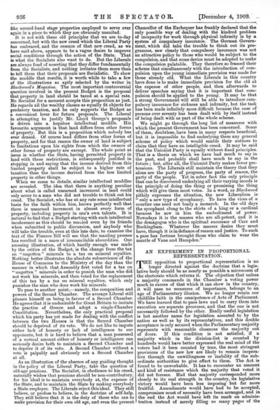THE INTELLECTUAL BANKRUPTCY OF LIBERALISM.
" BLACKWOOD'S Magazine " for December contains an article which all thoughtful Liberals ought certainly to read. They may perhaps be repelled. by the title, ".The Intellectual Bankruptcy of Liberalism," but they would. be wise to get over that repulsion and carefully study the arguments of the writer. Liberals have always claimed that they represent the intellectual party in the State, while the Tories are the stupid party. If that claim is still made, Liberals must be prepared to justify it. Can they do so ? In other words, is there any intellectual basis for their present creed ? The mere difficulty of defining that creed. alone furnishes a partial answer to the questions we are asking, for where a political creed has a clear intellectual basis there ought to be no difficulty in arriving at clear definitions. SO far as can be gathered from the record of the present Ministry, the modern creed of Liberalism consists in certain vague aspirations for im- proving the social condition of the masses of the people by means of the action of the State. These aspirations are combined with various remnants of the creed of earlier Liberals. For example, a demand for religious equality still forms a constant "tag" in Liberal speeches, although in practice those speeches may be directed towards demanding special favours for the particular form of religion which the speakers profess. Again, " trust in the people " is a phrase that trips lightly from the tongue of every Liberal rhetorician, although in practice the Liberals show their mistrust of the people by steadily opposing the whole idea of a Referendum, and by denouncing the House of Lords for giving the people an opportunity of expressing their opinions upon a matter so intimately concerning them as the taxation of the country. These illustrations very forcibly suggest that the old. principles of Liberalism are like second-hand stage properties employed to serve over again in a piece to which they are obviously unsuited. It is not with these old principles that we are to-day concerned, but with the new creed which the Liberal Party has embraced, and the essence of that new creed, as we have said above, appears to be a vague desire to improve social conditions through the action of the State. That is what the Socialists also want to do. But the Liberals are always fond of asserting that they differ fundamentally from the Socialists, and nothing irritates them more than to tell them that their proposals are Socialistic. To show the muddle that results, it is worth while to take a. few of the illustrations so aptly selected by the writer in Blackwood's Magazine. The most important controversial question involved in the present Budget is the proposal that property in land. should be taxed at a special rate. No Socialist for a moment accepts this proposition as just. He regards all the wealthy classes as equally fit objects for predatory. taxation, and he only supports the Budget as a convenient lever for future proposals. The Liberal in attempting to justify Mr. Lloyd George's proposals is driven into a hopeless intellectual muddle. His favourite argument is that land differs from other forms of property. But this is a proposition which nobody has ever denied. Of course land differs from other forms of property, and for that reason the owner of land is subject to limitations upon his rights from which the owners of other forms of property are exempt. The whole point at issue is whether the State, having permitted property in land with these restrictions, is subsequently justified in stepping in and saying that the income derived from this limited property shall be subject to a higher rate of taxation than the income derived from the less limited property in other things. When we come to details, similar intellectual muddles are revealed. The idea that there is anything peculiar about what is called unearned increment in land could only occur to a man who did not trouble to think out his creed. The Socialist, who has at any rate some intellectual basis for the faith within him, knows perfectly well that there is unearned increment in almost every form of property, including property in one's own talents. It is natural to find that a Budget starting with such intellectual incoherence as this should be mailed even by its friends when submitted to public discussion, and anybody who will take the trouble, even at this late date, to examine the text of the Finance Bill will see that the mauling process has resulted in a mass of irreconcilable absurdities. One amusing illustration, of which hardly enough was made by the critics of the Budget, is the change from the tax on " ungotten " minerals to a tax on mineral royalties. Nothing better illustrates the absolute subservience of the House of Commons to the Ministry of the day than the manner in which that Assembly first voted for a tax on " ungotten " minerals in order to punish the man who did not work his minerals, and then voted for the replacement of this tax by a tax on mineral royalties, which only punishes the man who does work his minerals. To pass to another point,—namely, the composition and powers of the Second Chamber. The average Liberal still plumes himself on being in favour of a Second Chamber. He agrees that it is undesirable for Great Britain to imitate the practice of Greece and adopt a single-Chamber Constitution. Nevertheless, the only practical proposal which his party has yet made for dealing with the conflict between the two Houses is that the Second Chamber should be deprived of its veto. We do not like to impute either lack of honesty or lack of intelligence to our opponents, but it is hard to believe that a man possessed of a normal amount either of honesty or intelligence can seriously desire both to maintain a Second Chamber and to deprive it of its veto. A Second Chamber without a veto is palpably and obviously not a Second Chamber at all.
As an illustration of the absence of any guiding thought in the policy of the Liberal Party, take the question of old-age pensions. The Socialist, in obedience to his creed, naturally wishes that pensions should be non-contributory, for his ideal is to maintain everybody at, the expense of the State, and to maintain the State by making everybody a State employee. The Liberals reject this ideal. They still believe, or profess to believe, in the doctrine of self-help. They still believe that it is the duty of those who can to make provision for their own old age, and even the present Chancellor of the Exchequer has frankly declared that the only- possible way of dealing with the kindred problem of incapacity for work through physical infirmity is by a system of compulsory insurance. The German Govern- ment, which did take the trouble to think out its pro- gramme, saw clearly that compulsory insurance was not an attractive policy to those who would be subject to the compulsion, and that some device must be adopted to make the compulsion palatable. They therefore so framed their scheme that simultaneously with the introduction of com- pulsion upon the young immediate provision was made for those already old. What the Liberals in this country have done is to make immediate provision for the old at the expense of other people, and then afterwards to deliver speeches saying that it is important that com- pulsion should be applied to the young. It may be that a strong Government will still be able to introduce com- pulsory insurance for sickness and infirmity, but the task has been made infinitely more difficult because the case of persons over seventy has been dealt with by itself instead of being dealt with as part of the whole scheme.
We might go through the long list of measures with which the present Government has been concerned. Some of them, doubtless, have been in many respects beneficial, but it is impossible to find underlying them any general scheme of policy which would. enable their authors to claim that they have an intelligible creed. It may be said that the Unionist Party is equally without fixed principles. That is a thesis on which we have had much to say in the past, and probably shall have much to say in the future ; but, after all, the Unionist Party makes fewer pre- tensions. The Liberals still maintain the theory that they alone are the party of progress, the party of reason, the party of the people. Yet in sober fact the only principle that can be discovered underlying all their varying moods is the principle of doing the thing or promising the thing which will give them most votes. In a word, as Blackwood pithily expresses the situation, the new Liberalism is " only a new type of sycophancy. To have the vices of a courtier one need. not toady a monarch. In the old days the sycophant clung to the skirts of a king or a cardinal because he saw in him the embodiment of power. Nowadays it is the masses who are all-potent, and it is the demagogue who is the spiritual successor of Carr and Buckingham. Whatever the masses desire they must have, though it is in defiance of reason and justice. To such a pass has fortune brought those who claim to wear the mantle of Vane and Hampden."







































































 Previous page
Previous page